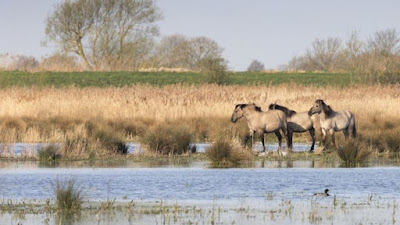An ancient "fenland oasis" near Cambridge is home to several never-before-seen species, naturalists have revealed.
The National Trust's oldest nature reserve, at Wicken Fen, has also seen cranes, otters and Norfolk hawkers return after an absence of decades.
It has been registered as the most species-rich area of the UK - with more than 9,300 animals recorded.
 |
| Konik ponies were reintroduced to Wicken Fen in 2005 |
A trust spokesman said the fen was "a mosaic of different habitats".
It began as a two-acre patch of wet fenland in 1899 and has expanded in the last 20 years to cover 1,941 acres (786 hectares).
Countryside manager Martin Lester said: "We've been able to create a mosaic of different habitats through progressive wetting of the land, using excess flood water from the river during the winter months."
 |
| Wicken Fen is home to 9,300 different animal species |
It is now home to 188 endangered species, including the bittern, marsh harrier, great crested newt, and the tiny soprano pipistrelle bat.
The latest discovery, a flat bark beetle called silvanus recticollis, has joined a list of 25 completely new species to the UK recorded at Wicken Fen since 1899 - with seven declared as "new to science".
 |
| The reserve is known for its rich peat soil, reed beds and wet woodland |
Fifty hardy grazing cattle and 100 Konik ponies have also been introduced to help the pollination process, Mr Lester said.
However, the area makes up less than 1% of the original fenland that dominated the east of England back in the 17th Century.
 |
| Wicken Fen is home to the bittern, which is an endangered species |
Mark Harold, from the National Trust, said: "The need to create more of this rare fenland habitat is greater than ever before.
 |
| Orange tip butterflies can also be seen at the reserve |
"Wicken is a real illustration of our strategy and desire to create a healthy, natural and beautiful environment that is bigger, better and more joined up for both wildlife and people."
(Source: BBC)





No comments:
Post a Comment